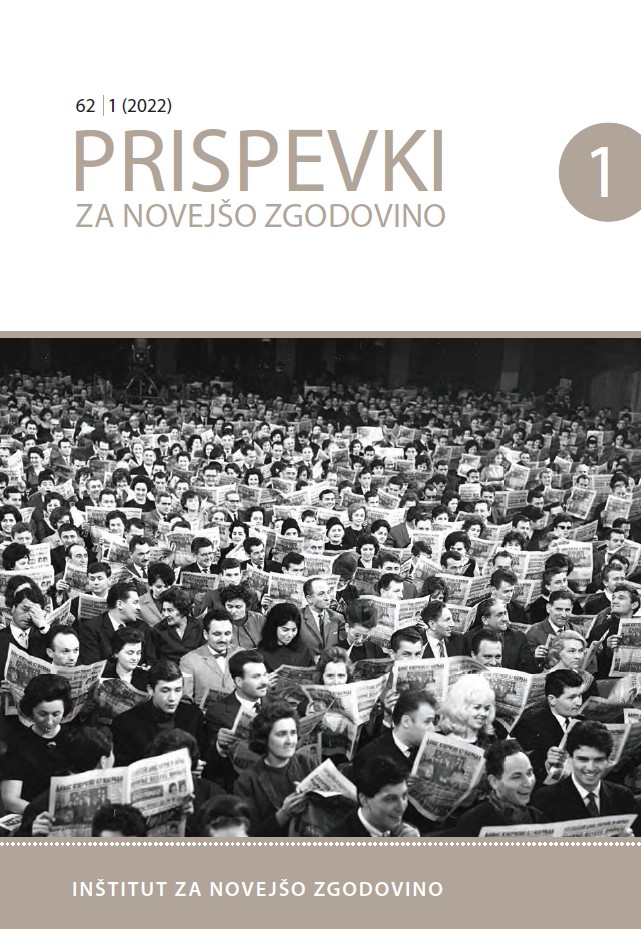Nastanek združenja neuvrščenih tiskovnih agencij
DOI:
https://doi.org/10.51663/pnz.62.1.2Ključne besede:
Jugoslavija, ibanje neuvrščenih, Tanjug, združenje neuvrščenih novičarskih agencijPovzetek
Članek se osredotoča na proces oblikovanja Združenja neuvrščenih novičarskih agencij in dejavnike, ki so oblikovali njegov razvoj. Avtor pojasnjuje nastanek združenja s tremi skupinami dejavnikov. Prvi so bili interesi in strategije jugoslovanskih političnih elit in novičarske agencije Tanjug. Medtem ko se je Tanjug zanimal za povečanje svojega globalnega dosega in položaja na svetovnem trgu novičarskih agencij, so ga zvezne politične elite videle kot pomembno orodje zunanje politike. Jugoslavija si je že v času pred četrtim vrhom neuvrščenih v Alžiru prizadevala za institucionalizacijo informacijskega sodelovanja, čeprav so bili objektivni pogoji ocenjeni kot minimalni. Drugi dejavnik so spremembe v mednarodnih odnosih, saj se je združenje tiskovnih agencij pojavilo v kontekstu institucionalizacije gibanja neuvrščenih v sedemdesetih letih prejšnjega stoletja in njegovih prizadevanj »zanašanja na lastne sile«, da bi države tako izboljšale svoj položaj v svetovnem gospodarstvu in pogajalsko moč v odnosu do razvitih držav. Združenje je zato Tanjugove dvostranske sporazume o izmenjavi novic rekontekstualiziralo v večstranski projekt gospodarskega sodelovanja znotraj gibanja neuvrščenih, katerega cilj sta bili krepitev medsebojnega razumevanja in osamosvojitev od globalnih (predvsem zahodnih) virov novic. Kot tretje pa je razvoj združenja oblikovala institucionalna zgodovina gibanja, saj je bilo združenje zasnovano in institucionalizirano po vzoru že obstoječih oblik gospodarskega sodelovanja. Za spoštovanje decentraliziranega duha gibanja je morala Jugoslavija prikriti svoj angažma pri vzpostavljanju združenja tiskovnih agencij in drugih oblik informacijskega sodelovanja ter jih predstaviti kot večstranske projekte s široko podporo znotraj gibanja neuvrščenih.
Literatura
Arrighi, Giovanni. Adam Smith in Beijing. London and New York: Verso, 2007.
Boyd-Barret, Oliver. “Western News Agencies and the ‘Media Imperialism’ Debate: What Kind of Data-Base.” Journal of International Affairs 3, No. 2 (1981): 247–60.
Boyd-Barrett, Oliver and Daya Thussu. Contra-Flow in Global News: International and Regional News Exchange Mechanisms. London: John Libbey, 1992.
Cizelj, Boris. Ekonomsko sodelovanje med deželami v razvoju: Teorija in praksa kolektivne opore na lastne sile. Ljubljana: Komunist, 1982.
Coordinating Committee. News Agencies Pool of Non-Aligned Countries. New Delhi: Indian Institute of Mass Communication, 1983.
Crain, Matthew. “Non-Aligned News Agencies Pool.” In: Encyclopaedia of Social Movement Media. Ed. John D. H. Downing, 367–69. Thousand Oaks: Sage, 2011.
Dinkel, Jürgen. Die Bewegung Bündnisfreier Staaten: Genese, Organisation und Politik (1927–1992). Oldenbourg: De Gruyter, 2015.
Gosovic, Branislav. UNCTAD - Conflict and Compromise. Leiden: A. W. Sijthoff, 1972.
Harris, Phil. “Le monde des agences de presse.” International Commission for the Study of Communication Problems, 11. Paris: UNESCO, 1978.
Ivačić, Pero. “The Flow of News: Tanjug, the Pool, and the National Agencies.” Journal of Communication 28, No. 4 (1978): 157–62.
Ivačić, Pero. “Toward a Freer and Multidimensional Flow of Information.” In: The Third World and Press Freedom. Ed. P. C. Horton, 135–50. New York: Praeger, 1978b.
Jakovina, Tvrtko. Treća strana hladnog rata. Croatia: Fraktura, 2011.
Jakubowicz, Karol. “Third World News Cooperation Schemes in Building a New International Communication Order: Do They Stand a Chance?.” Gazette 36 (1985): 81–93.
Lemberg, Diana. Barriers Down: How American Power and Free-Flow Policies Shaped Global Media. New York: Columbia University Press, 2019.
MacBride Commission. Many Voices, One World. Paris: Unesco, 1980.
Mankekar, D. R. One Way Free Flow. Neo-Colonialism via News Media. New Delhi: Clarion books, 1978.
Masmoudi, Mustapha. “The New World Information Order.” Journal of Communication 29, No. 2 (1979): 172–79.
Pavlič, Breda and Cees J. Hamelink. The New International Economic Order: Links between Economics and Communications. Paris: UNESCO, 1985.
Pinch, Edward T. “The Flow of News: An Assessment of the Non-Aligned News Agencies Pool.” Journal of Communication 28, no. 4 (1978): 163–71.
Roach, Colleen. “French Press Coverage of the Belgrade UNESCO Conference.” Journal of Communication 31, No. 4 (1981): 175–87.
Roach, Colleen. “The US Position on the New World Information and Communication Order.” Journal of Communication 37, No. 4 (1987): 36–51.
Robinson, Gertrude J. “Tanjug: Yugoslavia’s Multi-Faceted National News Agency.” PhD diss., University of Illinois, 1968.
Robinson, Gertrude J. “Foreign News Selection Is Non-Linear in Yugoslavia’s Tanjug Agency.” Journalism Quarterly 47, No. 2 (1970): 340–51.
Sauvant, Karl P. “Toward the New International Economic Order.” In: The New International Economic Order: Confrontation of Cooperation between North and South. Ed. Karl P. Sauvant and Hajo Hasenpflug, 3–19. Boulder, Colorado: Westview Press, 1977.
Sauvio, Roberto. “From New International Information Order to New Information Market Order.” In: From NWICO to WSIS: 30 Years of Communication Geopolitics. Eds. Divina Frau-Meigs, Jeremie Nicey, Michael Palmer, Julia Pohle and Patricio Tupper, 231–34. Bristol and Chicago: Intellect, 2013.
Schiller, Herbert I. Communication and Cultural Domination. New York: International Arts and Science Press, 1976.
Splichal, Slavko and France Vreg. Množično komuniciranje in razvoj demokracije. Ljubljana: Komunist, 1986.
Tanjug. Tanjug 1943–1963. Beograd: Tanjug, 1963.
Thompson, Mark. Forging War: The Media in Serbia, Croatia, Bosnia and Hercegovina. Luton: University of Luton Press, 1999.
Van Dinh, Tran. “Non-Alignment and Cultural Imperialism.” The Black Scholar: Journal of Black Studies and Research 8, No. 3 (1976): 39–49.
Verghese, George. “Press Censorship under Indira Gandhi.” In The Third World and Press Freedom. Ed. P. C. Horton, 220–30. New York: Praeger, 1978.
Objavljeno
Številka
Rubrika
Licenca
Avtorji prispevkov, objavljenih v tej reviji, soglašajo z naslednjimi pogoji glede avtorskih pravic:
- Avtorji ohranijo avtorske pravice, reviji pa odobrijo pravico do prve objave. Delo se hkrati zaščiti z licenco za prosto uporabo avtorskih del (Creative Commons Attribution License), ki drugim osebam omogoča deljenje dela ob priznanju avtorstva in prve objave v tej reviji.
- Avtorji lahko sklenejo ločene dodatne pogodbene dogovore za neizključno distribucijo različice dela, objavljene v reviji, (npr. oddaja v institucionalni repozitorij ali objava v knjigi) z navedbo, da je bilo delo prvič objavljeno v tej reviji.
- Pred postopkom pošiljanja in med njim lahko avtorji delo objavijo v spletu (npr. v institucionalnih repozitorijih ali na svoji spletnih strani), k čemer jih tudi spodbujamo, saj lahko to prispeva k plodnim izmenjavam ter hitrejšemu in obsežnejšemu navajanju objavljenega dela (glej The Effect of Open Access).
##plugins.generic.funding.fundingData##
-
Javna Agencija za Raziskovalno Dejavnost RS
##plugins.generic.funding.funderGrants## J5-1793


